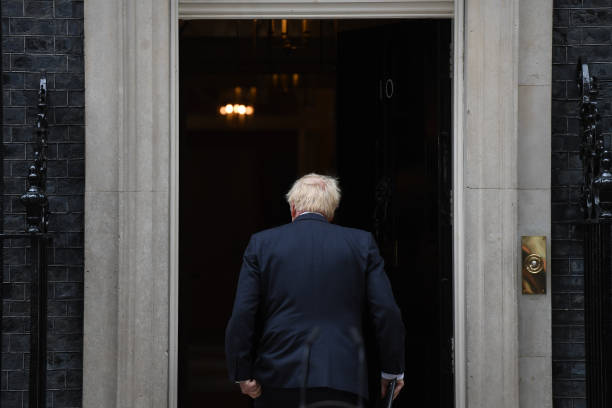It’s an ignominious end.
After days of mortifying delusion as he clung to power, Boris Johnson has announced he’s stepping down as British Prime Minister and leader of the Conservative Party.
It follows a whirlwind 48 hours in which Rishi Sunak the Chancellor and the Health Secretary Sajid Javid resigned their ministerial portfolios calling for dignity in power, prompting an extraordinary 60 resignations from within Government, with once supportive colleagues were left completely fed up and fearful for their futures.
Mr Johnson’s hand was forced after his ministers and Conservative MPs quit or withdrew their support over the scandal surrounding former deputy chief whip Chris Pincher, who quit after allegedly assaulting two men while drunk at private members’ club.
Remarkably and much to the chagrin of Labour, the Lib Dems and some in Ireland and across Europe due to the Northern Ireland Protocol issues post-Brexit, Johnson will stay on as PM until a new Tory leader is elected, despite the calls of some from within the Conservative party ranks who wanted a caretaker leader.
Boris Johnson has hardly been a glowing success for Britain having stretched Britain’s constitutional arrangements to their very limit, going far beyond all previous leaders in his determination to cling to power.
On Wednesday in the face of all known reality when his friend and colleague Michael Gove told Johnson that the game was up, the PM responded by sacking him.
In his subsequent address outside No. 10 he showed little in the way if humility and instead it became clear he was forced unwillingly from his position:
“And in the last few days, I tried to persuade my colleagues that it would be eccentric to change governments when we’re delivering so much and when we have such a vast mandate and when we’re actually only a handful of points behind in the polls, even in mid-term after quite a few months of pretty relentless sledging and when the economic scene is so difficult domestically and internationally.”
“And I regret not to have been successful in those arguments and of course it’s painful not to be able to see through so many ideas and projects myself.”
Johnson has ignored all known convention on the transfer of power, and sought to reference “his” mandate of 14 million votes at the last General Election. The mandate in question was raised several times in his resignation speech outside Ten Downing Street on Thursday, even though British politics does not work like a U.S. constitution.
In his resignation speech in the Commons, outgoing Health Secretary Sajid Javid recognised the effect that Johnson has had on public life and he expressed alarm about the long-term consequences.
“I am deeply concerned about how the next generation will see the Conservative Party on our current course,” Javid told the house. “Our reputation after 12 years in government depends on regaining the public’s trust.”
The much-maligned Brexit deal, that Johnson negotiated appears so flawed that he has since tried to re-write it. In his resignation speech apart from referencing his electoral “mandate”, he mentioned the “fastest vaccine rollout in Europe” as evidence of success, and that Britain was “leading the west in standing up to Putin’s aggression in Ukraine”.
The outgoing leader said that a “timetable shall be announced next week” for a successor. This suggests that he intends to stay on in a caretaker role, while the Conservative party appoints a new leader.








